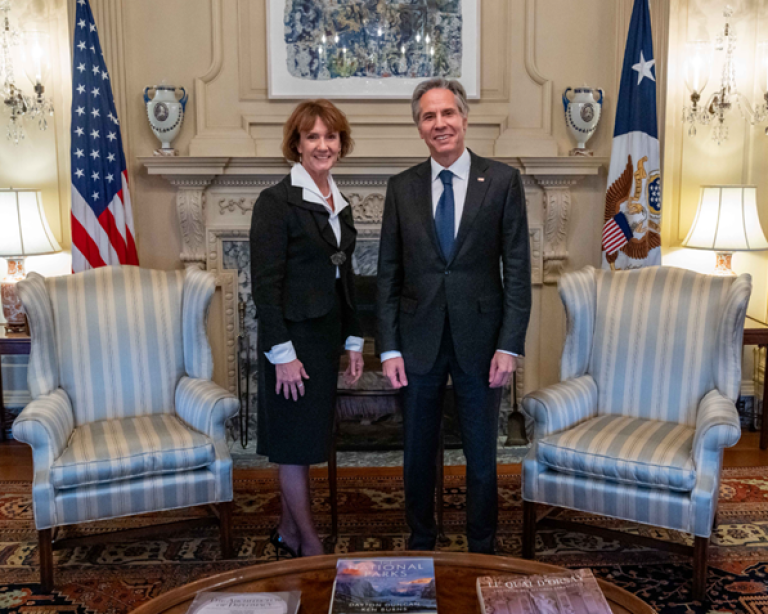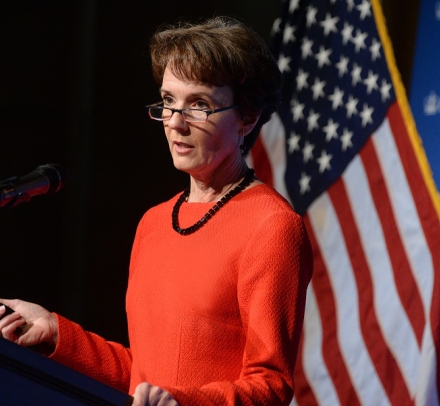Five Questions on the International Court of Justice for Judge-Elect Sarah Cleveland
The Columbia Law professor will become one of 15 members of the United Nations’ main judicial body, which adjudicates cases between nations on disputes that increasingly involve human rights issues.
When she takes her seat in February, Sarah H. Cleveland, Louis Henkin Professor of Human and Constitutional Rights, will become the sixth woman—and the second U.S. woman—to serve on the International Court of Justice (ICJ), the principal judicial body of the United Nations.
The ICJ, sometimes called the World Court, sits in The Hague and was established in 1945 to settle legal disputes among U.N. member states and to issue advisory opinions on legal questions referred to it by U.N. bodies and agencies. Judges are elected by a vote of the U.N. General Assembly and the Security Council.
Cleveland, who joined Columbia Law School in 2007, has served on the U.N. Human Rights Committee and the European Commission for Democracy through Law (Venice Commission). She has also been the counselor on international law to the legal adviser at the U.S. State Department.
How are judges elected to the ICJ?
Five seats on the ICJ are filled in each general election. The judges are elected to nine-year terms and are nominated by each country’s National Group to the Permanent Court of Arbitration. You are not directly nominated by your government; you are nominated by the national group of international law experts that is appointed by your government. It’s a mechanism that is intended to make the nomination process somewhat independent from government.
The ICJ judges are elected concurrently by the U.N. Security Council and by the General Assembly. Each body votes separately and secretly, and they vote until only five candidates have a majority in that body. Then the lists of the candidates with a majority in each body are compared, and any candidates who are on both lists are elected. If that does not fill all five seats, there is a runoff.
I was first approached in 2022 regarding this position. I had conversations with the various members of the U.S. national group, and then I was nominated by them. Then it is the U.S. government’s responsibility to support your campaign and actually get you elected.
You had to campaign for the position. What was that like?
Each national group can nominate up to four candidates, so you can be co-nominated by other states’ national groups. I was honored to be nominated by the national groups of over 50 other countries across six continents, which is important because it reflects very broad-based support among different legal traditions and cultures. But then you realize that none of these national groups actually votes for you. It is the governments that vote for you in the U.N., and some national groups are very independent of their governments. So, there is one process of campaigning for the support of national groups, and a second process of securing the votes of governments.
There is no formal regional allocation of seats on the court, although there is an informal tradition of geographic distribution. The United States has always had a judge on the court, since its inception. But securing strong support across all the different U.N. regions is increasingly important, particularly for the vote in the General Assembly.
In the course of my campaign, I visited 26 countries on five continents. I met with over 185 countries, many of them multiple times, in multiple places. In all of these meetings, I would explain the values that would guide me as a judge and my experience that was relevant to the state and the region. Fundamentally, what the rest of the world wanted to see was that the U.S. candidate to the court was independent from the U.S. government, was interested in their individual countries, and understood their perspective. They did not want a judge from a permanent member of the Security Council who would predictably vote for her own country’s interests. I have a long record of independence from the U.S. government, since my very first case—as a student in a human rights clinic at Yale Law School—which was a lawsuit against the U.S. government on behalf of Haitian refugees detained at Guantanamo.
An elaborate process accompanies these international campaigns. I had a brochure, which was translated into all six U.N. languages, plus Portuguese. I had a website; there was a video from U.S. Secretary of State Antony Blinken [Class of 1988] about me, and I had my own video, featuring in part my Columbia students. We had campaign banners, pins, notebooks, pens, tote bags. I had a campaign Twitter account, and members of the U.S. government and I all tweeted my campaign events.

What were the politics involved in this year’s ICJ election?
The campaign for election to the ICJ reflected many of the geopolitical shifts that we are seeing globally. There has been discussion in the U.N. for many years about whether there should be more diversity of representation on the Security Council. That plays out with states taking the view—I think quite fairly—that no state should be automatically entitled to have a judge on the ICJ. This was the second time that one of the five permanent members of the Security Council—Russia—lost a seat on the court. The first was the U.K., in 2017.
Four candidates from Africa were nominated. A judge from Morocco retired; traditionally, this would be the seat for a candidate from Africa. In the past, the African Union has reached consensus on a candidate, and then all 54 states of the African continent have voted for that candidate, giving that person a great deal of momentum. But this year, there was no agreement among the African states. Egypt nominated a candidate because, in their view, this was a North African seat and an Arab seat. The Democratic Republic of the Congo nominated a candidate because they viewed this as a Francophone seat. Zambia and South Africa nominated candidates because there has never been a judge on the court from Southern Africa. [The South African candidate, Dire Tladi, was elected.]
Another background issue in the campaign was the situation in Israel/Gaza. One of the cases pending before the court is a request for an advisory opinion on international law violations against the Palestinians, which was sent to the court by the General Assembly a year ago. The oral hearings in that case are scheduled for February, right after the new court is seated. So, the October 7 Hamas attack on Israel and Israel’s ongoing response in Gaza put the Middle East squarely at issue in the election.
What other types of issues are before the ICJ right now?
The court is busier than it has ever been. It currently has 22 cases. Last year, it had 15 cases, and even then, it was busier than it had ever been. The court’s docket is filling, in part because the court has succeeded in avoiding the political controversies and appearance of politicization that have affected some other international and regional courts. The court has a long history of addressing the right to self-determination in the context of decolonization. Decisions such as its recent advisory opinion concluding that Mauritius, rather than the U.K., properly enjoys sovereignty over the Chagos Archipelago, have led states in the Global South to view the court as one that will fairly protect their equal rights in the international system. I think the court’s increased docket also reflects the very many challenges that the international community is currently facing and the failure of the political bodies of the U.N. and our regional systems to address those issues effectively.
The international community is bringing increasingly existential topics to The Hague. Last spring, over 130 countries in the General Assembly requested an advisory opinion from the court on the international law obligations of states relating to climate change. This initiative came from a group of law students in the Pacific Island state of Vanuatu and reflects frustration over the inadequacy of the international community’s response to climate change. Another request came from the International Labor Organization (ILO) for an advisory opinion on the right to strike. This is a significant issue that has been lingering in international labor rights for decades.
The court has two cases between Russia and Ukraine, one of them involving the current conflict, in which 32 countries have intervened. The court has two cases between Azerbaijan and Armenia under the Convention on the Elimination of Racial Discrimination arising from the recent conflict there; a case brought by The Gambia against Myanmar alleging genocide against the Rohingya; and several cases between Iran and the United States. Canada and the Netherlands have brought a case against Syria under the Convention against Torture.
So, a court that traditionally did not deal with human rights issues, except for the right to self-determination, now has a very broad human rights docket
How has your time teaching at Columbia Law School prepared you for serving on the court?
It has been critical. Not only because of the wide range of subjects that I have taught and the superb colleagues I have worked with, but because of the students from all over the world whom I have had the opportunity to teach and learn from. States appreciated that I have taught international law subjects from armed conflict to the law of the sea. They also appreciated that I have been a lifelong professor of civil procedure since judicial procedural is essential to the effective functioning of any court.
Former students of mine in many international law contexts, from Singapore to South Sudan, were very helpful and supportive. All over the world, during my election campaign, when people saw that I was on the faculty at Columbia Law School, the universal reaction was, “You are from one of the world’s great universities.” Columbia is an educational institution that is globally recognized and admired. Many people knew someone who had studied here, or had studied here, or served as a visiting scholar here, or wanted to study here. That was important.
This interview has been edited and condensed.
